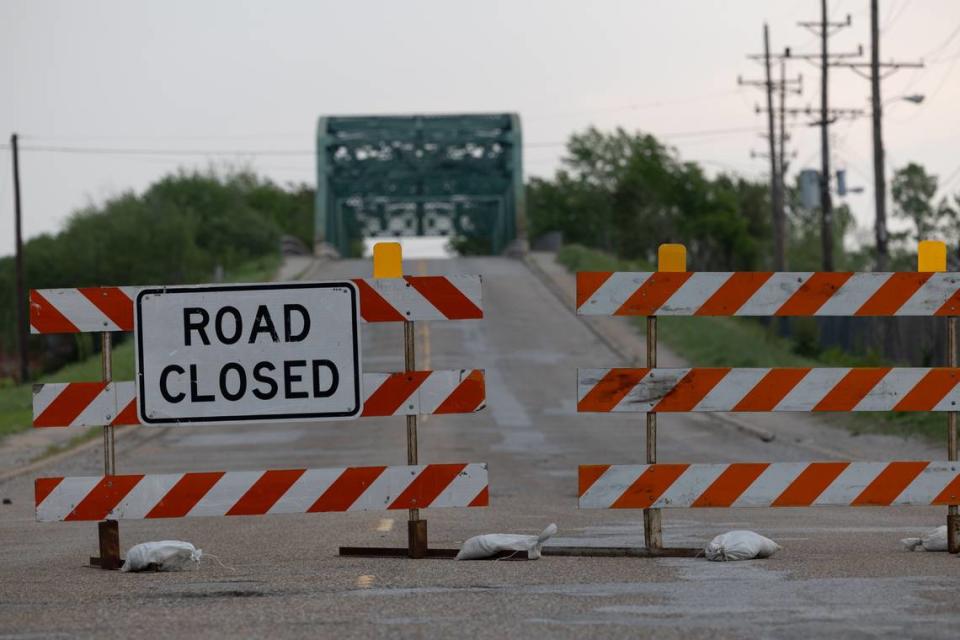In Reality Check stories, BND journalists dig deeper into questions over facts, consequences and accountability. Read more. Story idea? [email protected].
Residents, businesses and public officials are raising concerns about safety, impeded access to their neighborhoods and other issues due to the April closing of a bridge on 26th Street in East St. Louis.
They want the damaged bridge to be repaired and reopened quickly, but word is that it may take months. No official timetable has been released.
“It has my area blocked in and a lot of my elderly people are having problems,” said Kinnis Williams Sr., Democratic precinct committeeman for the area. “ It’s an old neighborhood, and there are a bunch of elderly people living there. They are concerned and I am concerned for them.”
Williams is also the St. Clair County Circuit Clerk.
A vehicle damaged the heavily traveled bridge at 26th Street and Missouri Avenue on April 21, forcing the Illinois Department of Transportation to close it indefinitely over safety concerns. Initial inspections found “significant damage to multiple truss members,” Dawn Johnson, regional communications liaison for Region 5 of the Illinois Department of Transportation, said last month.
The bridge allows motorists to avoid having to cross Norfolk Southern railroad tracks that run beneath the structure. In East St. Louis, residents and others are often frustrated about navigating around stopped trains that block roads, so the bridge closing is particularly aggravating.
Illinois Department of Transportation officials are aware of the impact of the closing, but they had to close it to ensure the safety of motorists, Johnson has said.
“Our structural engineers are still assessing the bridge,” she said this week. “We anticipate determining our preliminary plans in a couple of weeks.”
Meanwhile, residents and business people remain frustrated.
Linda Joiner, whose 92-year old mom has been a longtime East St. Louis resident, said the bridge situation “is horrible.”
“I use that bridge two, three, four times a day. I go across it to go to work, to go to church, to go shopping, everything,” Joiner said.
The bridge closing is “terrifying” to her mother, who lives nearby and counts on Joiner to be able to get to her quickly, like during recent severe storms. Joiner couldn’t get to her quickly by the easy route that the bridge provides.
“I tried to go through Alorton to get on Bond. There was a train sitting on Bond, not moving. So, I decided to go back around to take 18th Street to get to Bond,” she said. “It’s like dodging a mine field on some of the streets in the city, always has been. But now we are going to have even more potholes because trucks and cars and everybody has to take these two different routes.”
Part of the safety factor too is that Joiner doesn’t want to be stuck in her car on the road waiting for a train to move.
“From a safety perspective, I am not going to sit there and be a sitting duck for somebody possibly wanting to rob me, hurt me or cause any kind of problem,” she said. “I hate to be that way, but that’s the world we live in right now.
“It has nothing to do with my love for the city. I love the city,” she said.
Her ties to East St. Louis are deep, as are her mother’s, who lives in the house Joiner’s father built.
“My point is something as simple as a bridge being shut down can wreak all kinds of havoc,” she said. “People have to find a different way to get to work. It’s just bad.”
John McIntosh, owner of New York Cleaners on State Street, is worried that some of his customers will go to other cleaners to avoid the hassle of getting to his business because of the 26th Street bridge closure.
“It is obviously creating an inconvenience for customers getting here,” he said. “And, it could also have an impact where we could end up losing business due to the lack of access.
“If customers can’t reach us, they may choose to go to some easier alternative. It could have a bigger impact on our employees who depend on customers to give us work.”
McIntosh said some customers have complained about the bridge being closed. “And, we are not getting any clear-cut answers,” he said. “I don’t know how quick they are going to respond, but I have heard it could be mid-July. That is a long time.”
A bigger concern, he said, is that people who need emergency services may not get them as quickly with the bridge being closed.
“At any given moment you could have a blockage of a railroad. That bridge was the only confident thoroughfare that you had to get to the highway to access a need for maybe some emergency,” McIntosh said.
He said there should be a town hall meeting where state Transportation Department officials can hear residents’ concerns and let people know their plans for the bridge.

Jung Truck Service Inc., based in Mascoutah, has a building at 2400 McCasland Ave. in East St. Louis where trucks move in and out and are loaded and unloaded. The bridge closing has had an impact on the business, according to company President Bruce Jung.
Jung Trucking normally averages about 250 trucks in his East St. Louis facility daily.
“We’re still getting them. But it’s such a lengthy way for them to get to us,” he said. “Plus our trucks. We run a fleet of 100 trucks. It has added so much time to everybody’s day to go around that bridge.
“One of the things that attracted us to that property in the very beginning was the fact you could come off of (Interstate) 255 and stay on state routes and basically not have ground level rail crossings.”
Another big concern about the closed bridge, Jung said, is public safety.
“What are fire trucks and ambulances doing that would normally take that bridge? They are taking the chance of being stopped at a railroad crossing. That is a real big factor,” Jung said.
He said trains often block roads in East St. Louis. “If something happens at one of our facilities, how is fire or ambulance going to get to us necessarily or get back out?”
There just aren’t many alternate routes, Jung said.
“I couldn’t tell you how many thousands of commuters take that way to get to St. Louis in the mornings,” he said. “ Thousands, I am sure.”
Jung said it is an important corridor “not only for trucks, but the general public.”
Williams, the precinct committeeman for the area, acknowledged the problem with the trains that sit on tracks and block the roads in East St. Louis and Alorton, creating long wait periods for motorists before they can continue on east or west.
“If you go either way besides the bridge… and go through Alorton or by 21st and Bond, Market or Trendley, you’re going to get stopped by a train,” he said. “It is kind of a problem. If there was a real emergency we could have a big problem right there.”
Williams said he learned from the Illinois Department of Transportation that “a beam” will arrive in July and workers will be able to fix the bridge.
“We are in bad shape,” he said.
Williams said he’s met with St. Clair County Board Chairman Mark Kern about the bridge problem, and Kern met with state Transportation Department officials.
Kern and State Sen. Chris Belt, who represents the area, could not be reached for comment.
A spokesperson for Norfolk Southern also could not be reached.
Source Agencies


